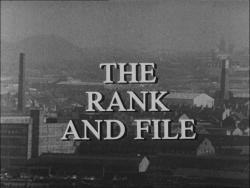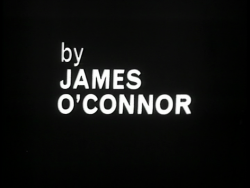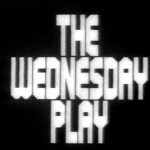by JOHN WILLIAMS
Play for Today Writer: Jim Allen; Director: Kenneth Loach; Producer: Graeme McDonald
‘I go along with Trotsky, that life is beautiful, that the future generation cleanses all the oppression, violence and evil’

Most of Ken Loach’s work for television has attracted at least some critical writing because of his towering reputation in the cinema. Even so, The Rank and File has generally been overlooked in favour of the first Loach/Allen Wednesday Play collaboration The Big Flame (1969), and both writer and director seem to have mixed feelings about the piece. Allen stated that the play ‘was written in three weeks…if you get too didactic, politically or otherwise, as I probably did in The Rank and File, it can be a lantern lecture’,1 and Loach has commented that ‘the [films] we’ve done that show their age badly are the ones where you’re trying to catch the headlines and be topical…some of the films from the early seventies’.2 However Rank…, while superficially similar to The Big Flame, was written for specific reasons about a recent strike, rather than a (prophetic) vision of a political occupation. And Loach’s own reference to topicality should lead us consider that one of the strengths of the Play for Today strand lay in the ability, as in this case, to move with astonishing speed from a real-life event to a fictional representation in just under 11 months. The urgency of such a representation is not diminished just because the events that inspired Rank… have become obscure footnotes in twentieth century industrial relations, but I’d like to try and illuminate some of the historical background to the play, and also look at what it tells us about the role of politics, specifically Trotskyite politics, in the BBC Plays department at the time.
 James O’Connor – often known as Jimmy O’Connor – wrote a number of popular and successful television plays in the 1960s and early ‘70s, regularly collaborating with director Ken Loach. He had an unusual background for a television dramatist. He was formerly a career criminal who had turned to writing while serving a life sentence for murder, having narrowly avoided being hanged.
James O’Connor – often known as Jimmy O’Connor – wrote a number of popular and successful television plays in the 1960s and early ‘70s, regularly collaborating with director Ken Loach. He had an unusual background for a television dramatist. He was formerly a career criminal who had turned to writing while serving a life sentence for murder, having narrowly avoided being hanged. 

